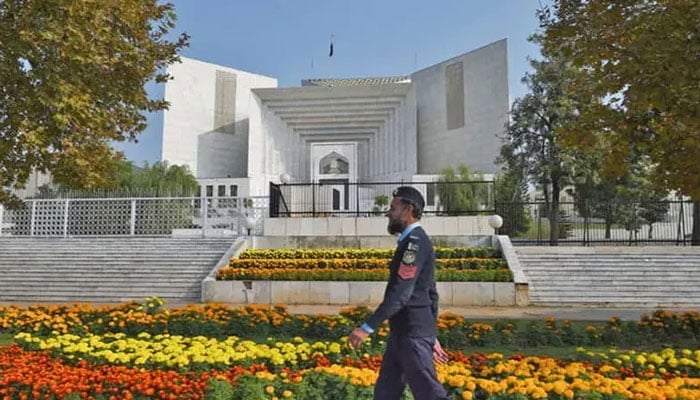SC rules inheritance rights of the vulnerable must be safeguarded
Court imposed fine of Rs300,000 on petitioner for filing frivolous petition and employing dishonest tactics
ISLAMABAD: The Supreme Court has ruled that the inheritance rights of vulnerable members of society, including women, must be protected.
A three-member bench of the apex court, headed by Chief Justice Qazi Faez Isa and comprising Justice Naeem Akhtar Afghan and Justice Shahid Bilal Hassan, issued a written order in a case related to inheritance. The court had heard the case on October 2, 2024.
The court imposed a fine of Rs300,000 on the petitioner, Tanveer Sarfaraz Khan, for filing a frivolous petition and employing dishonest tactics. The petitioner was directed to pay this amount to his sisters, who had been deprived of their legal shares.
The court further ruled that the respondents (sisters) would be justified in claiming mesne profits for the period during which the petitioner fails to comply with the consent/joint statement.
“Unfortunately, a practice has developed whereby those defying Shariah and the law, facilitated by some lawyers, adopt various nefarious means, including taking the plea of pending litigation, to deprive legal heirs of what is rightfully theirs,” stated the two-page written order authored by Chief Justice Qazi Faez Isa.
According to the order, the case pertains to the estate of Sarfraz Ahmad Khan, who passed away in 2010, leaving behind five sons, five daughters, and a widow. His estate included a house constructed on 12 marlas and 218 square feet in Rawalpindi (“the Property”).
The court noted that when the petitioner’s sisters claimed their inheritance, the petitioner initially agreed to have the property evaluated and to pay the legal heirs of Sarfraz Ahmad Khan their respective shares according to Shariah law. However, after the property was evaluated, the petitioner, Tanveer Sarfaraz, reneged on his commitment and challenged his signed “Consent/Joint Statement” before the high court.
The judgment noted that, when confronted, the petitioner’s lawyer claimed that his client did not understand what he had signed but also conceded that the counsel had been present at the time. When the court asked the petitioner about his background, he said that he had retired a year ago as an assistant in the education department and confirmed that he could read and write. “Therefore, the ground taken by him to challenge the ‘Consent/Joint Statement’ was unjustified,” the court held.
The petitioner’s lawyer then referred to a “Suit for Partition, Declaration, Specific Performance, and Permanent Injunction” filed by the petitioner on December 15, 2021. However, the court noted that the petitioner only filed this suit two months after his sisters had sought their share in the inheritance on October 11, 2021 — more than 11 years after Sarfraz Ahmad Khan’s death.
The court further clarified that the pendency of this suit had no effect on the estate of Sarfraz Ahmad Khan and did not exclude the legal heirs from their inheritance. The court reiterated that the property of a deceased Muslim vests in his legal heirs immediately upon his death. “We have repeatedly held that the inheritance rights of vulnerable members of society, including women, must be protected,” the court emphasized. The court ruled that the petitioner’s frivolous petition and dishonest tactics warranted its dismissal with costs. The petitioner was directed to pay Rs300,000 equally to the respondents who had been deprived of their rightful shares. “The respondents are also entitled to claim mesne profits for all the days that the petitioner fails to comply with the said ‘Consent/Joint Statement,’” the court concluded.
-
 JoJo Siwa Shares Inspiring Words With Young Changemakers
JoJo Siwa Shares Inspiring Words With Young Changemakers -
 James Van Der Beek Loved Ones Breaks Silence After Fundraiser Hits $2.2M
James Van Der Beek Loved Ones Breaks Silence After Fundraiser Hits $2.2M -
 Disney’s $336m 'Snow White' Remake Ends With $170m Box Office Loss: Report
Disney’s $336m 'Snow White' Remake Ends With $170m Box Office Loss: Report -
 Travis Kelce's Mom Donna Kelce Breaks Silence On His Retirement Plans
Travis Kelce's Mom Donna Kelce Breaks Silence On His Retirement Plans -
 Premiere Date Of 'Spider-Noir' Featuring Nicolas Cage Announced
Premiere Date Of 'Spider-Noir' Featuring Nicolas Cage Announced -
 Pedro Pascal's Sister Reveals His Reaction To Her 'The Beauty' Role
Pedro Pascal's Sister Reveals His Reaction To Her 'The Beauty' Role -
 Kate Middleton Proves She's True 'children's Princess' With THIS Move
Kate Middleton Proves She's True 'children's Princess' With THIS Move -
 Paul Anka Reveals How He Raised Son Ethan Differently From His Daughters
Paul Anka Reveals How He Raised Son Ethan Differently From His Daughters -
 'A Very Special Visitor' Meets Queen Camilla At Clarence House
'A Very Special Visitor' Meets Queen Camilla At Clarence House -
 Jodie Turner Smith Shares One Strict Rule She Follows As A Mom
Jodie Turner Smith Shares One Strict Rule She Follows As A Mom -
 Hailey Bieber Reveals KEY To Balancing Motherhood With Career
Hailey Bieber Reveals KEY To Balancing Motherhood With Career -
 Photo Of Jay-Z, Other Prominent Figures With Jeffrey Epstein Proven To Be Fake
Photo Of Jay-Z, Other Prominent Figures With Jeffrey Epstein Proven To Be Fake -
 Hillary Clinton's Munich Train Video Sparks Conspiracy Theories
Hillary Clinton's Munich Train Video Sparks Conspiracy Theories -
 Fans Slam Talk Show Host For 'cringe' Behavior In Chris Hemsworth Interview
Fans Slam Talk Show Host For 'cringe' Behavior In Chris Hemsworth Interview -
 Woman Jailed Over False 'crime In Space' Claim Against NASA Astronaut
Woman Jailed Over False 'crime In Space' Claim Against NASA Astronaut -
 James Van Der Beek’s Close Pal Reveals Family's Dire Need Of Donations
James Van Der Beek’s Close Pal Reveals Family's Dire Need Of Donations




